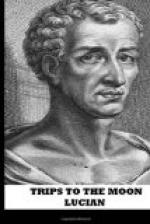“I am no god, why call’st thou me divine?” {170}
I am Empedocles, the naturalist: after I had leaped into the furnace, a vapour from AEtna carried me up hither, and here I live in the moon and feed upon dew: I am come to free you from your present distress.” “You are very kind,” said I, “most noble Empedocles, and when I fly back to Greece, I shall not forget to pay my devotions to you in the tunnel of my chimney every new moon.” “Think not,” replied he, “that I do this for the sake of any reward I might expect for it; by Endymion, {171} that is not the case, but I was really grieved to see you so uneasy: and now, how shall we contrive to make you see clear?” “That, by Jove,” said I, “I cannot guess, unless you can take off this mist from my eyes, for they are horribly dim at present.” “You have brought the remedy along with you.” “How so?” “Have you not got an eagle’s wing?” “True, but what has that to do with an eye?” “An eagle, you know, is more sharp-sighted than any other creature, and the only one that can look against the sun: your true royal bird is known by never winking at the rays, be they ever so strong.” “So I have heard, and I am sorry I did not, before I came up, take out my own eyes and put in the eagle’s; thus imperfect, to be sure, I am not royally furnished, but a kind of bastard bird.” “You may have one royal eye, for all that, if you please; it is only when you rise up to fly, holding the vulture’s wing still, and moving the eagle’s only; by which means, you will see clearly with one, though not at all with the other.” “That will do, and is sufficient for me; I have often seen smiths, and other artists, look with one eye only, to make their work the truer.” This conversation ended, Empedocles vanished into smoke, and I saw no more of him. I acted as he advised me, and no sooner moved my eagle’s wing, than a great light came all around me, and I saw everything as clear as possible: looking down to earth, I beheld distinctly cities and men, and everything that passed amongst them; not only what they did openly, but whatever was going on at home, and in their own houses, where they thought to conceal it. I saw Lysimachus betrayed by his son; {172a} Antiochus intriguing with his mother-in-law; {172b} Alexander the Thessalian slain by his wife; and Attalus poisoned by his son: in another place I saw Arsaces killing his wife, and the eunuch Arbaces drawing his sword upon Arsaces; Spartim, the Mede, dragged by the heels from the banquet by his guards, and knocked on the head with a cup. In the palaces of Scythia and Thrace the same wickedness was going forward; and nothing could I see but murderers, adulterers, conspirators, false swearers, men in perpetual terrors, and betrayed by their dearest friends and acquaintance.
Such was the employment of kings and great men: in private houses there was something more ridiculous; there I saw Hermodorus the Epicurean forswearing himself for a thousand drachmas; Agathocles the Stoic quarrelling with his disciples about the salary for tuition; Clinias the orator stealing a phial out of the temple; not to mention a thousand others, who were undermining walls, litigating in the forum, extorting money, or lending it upon usury; a sight, upon the whole, of wonderful variety.




